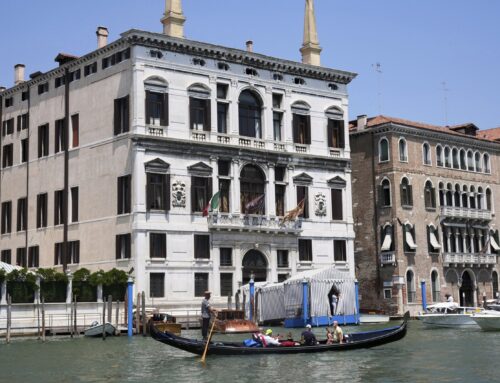NH beverage producers working to brew a greener future
June 26, 2025
COMPROMISING THE ENVIRONMENT. WE VIEW EVERYTHING THROUGH THE LENS OF WHAT ITS IMPACT ON THE ENVIRONMENT IS. NORTH CONWAY IS CATHEDRAL LEDGE DISTILLERY UTILIZES THE NATURAL RESOURCES OF THE WHITE MOUNTAINS TO CRAFT A VARIETY OF SPIRITS. CHRISTOPHER BURKE AND HIS WIFE TRACEY ARE DEEPLY CONNECTED TO THEIR AGRARIAN HERITAGE AND TAKE PRIDE IN PROTECTING THE LAND THAT SURROUNDS THEM. CATHEDRAL LEDGE IS NEW HAMPSHIRE’S ONLY ORGANIC DISTILLERY. NO GENETICALLY MODIFIED ORGANISMS, NO SYNTHETIC FERTILIZERS OR PESTICIDES. ALL OF OUR CLEANING PRODUCTS ARE ORGANIC. DISTILLING CAN BE A VERY ENERGY INTENSIVE PROCESS. TO COMBAT THIS, BURKE AND HIS TEAM GOT CREATIVE. THEY BUILT A GRAIN HANDLING SYSTEM THAT REDUCES THEIR RELIANCE ON DELIVERIES, CUTTING BACK ON EMISSIONS. WE HAVE TO COOK THE GRAINS LIKE EVERYBODY ELSE, BUT WE DO IT WITH A VERY HIGH EFFICIENCY BOILER. AND INSIDE THE BUILDING, THE WATER USED FOR BOILING IS SENT TO UNDERGROUND TANKS, WHICH SENDS THE EXPELLED WARMTH THROUGH THEIR RADIANT FLOORS. THAT LETS US RETAIN HEAT IN THE WINTER SO WE DON’T EVER BURN PROPANE TO HEAT THE SPACE. WE CONSERVE THE PROCESS ENERGY. BREWING BEER CAN ALSO BE AN INTENSIVE PROCESS FOR BREWING COMPANY, AND EPSOM IS FINDING CREATIVE SOLUTIONS TO MANAGE THEIR ENERGY OUTPUT. THE TALK IS ABOUT SUSTAINABILITY. WE’RE FACING SOME THINGS. THERE MAY BE SOME CHALLENGES COMING AND IT’S AN ISSUE OF SURVIVABILITY. DAVE STEWART RECENTLY FINISHED AN EXPANSION OF HIS CRAFT BREWERY. IT RUNS THE WHOLE SHOW, POWERED BY 182 SOLAR PANELS. WE’VE NOW GOT A SOLAR ARRAY THAT GENERATES MORE POWER THAN WE’RE CURRENTLY USING, BUT IT WAS SIZED IN THE EVENT THAT WE WERE GOING TO EXPAND. AND SO I’M THINKING THAT WE’RE GOING TO USE MOST OF THAT ENERGY TO MAXIMIZE EFFICIENCY. STEWART BUILT AN UNDERGROUND GEOTHERMAL CHILLER TO FINISH THE BREWING PROCESS. SO WHAT THIS DOES IS IT KIND OF PRE CHILLS. YOU TAKE COLD WATER AND USE THE TEMPERATURE OF THE GROUND TO COOL THE WORT DOWN AND THEN SCRUB THE HEAT AND THEN RECYCLE THE WATER. THIS NEW SETUP WILL ALLOW HIM TO START CANNING AND FILL EVEN MORE TAPS IN THE BREWPUB THIS SUMMER. WE JUST KEEP STEPPING IT UP TO BIGGER AND BIGGER. NEW HAMPSHIRE’S HARSH CLIMATE MAKES IT TOUGH FOR VINEYARDS TO THRIVE, BUT APOLLO VINEYARDS IS CHARTING A NEW COURSE. WE CAN PRODUCE WINES THAT RIVAL SOME OF THE BEST PLACES IN THE WORLD. JUST IN THIS LITTLE BACKYARD. VINEYARD AIR FORCE VETERAN TURNED WINEMAKER MIKE APOLLO FOUND HIS NICHE WHEN HE STARTED GROWING HIS SIGNATURE WHITE GRAPE. BRIANNA, RIGHT HERE IN DERRY. IT WAS REALLY ABOUT FINDING THE RIGHT GRAPE TO GROW HERE. I WAS ONE OF THE FIRST IN NEW ENGLAND TO GROW, BRIANNA, AND NOW IT’S GROWN. I BELIEVE IN ALL SIX STATES. THESE HYBRID VARIETIES OF GRAPES ARE HARDY ENOUGH TO WITHSTAND COLD NORTHERN NEW ENGLAND WINTERS, AND ARE VERY PRODUCTIVE IN A SHORT GROWING SEASON. WE’RE GOING TO SET FRUIT IN JUNE AND HARVEST IN AUGUST. THAT’S PRETTY QUICK. RIPENING WINDOW. THESE GRAPES ARE BRED TO FEND OFF MOLD AND DISEASE, SAVING, POTENTIALLY HARSH CHEMICALS FROM ENTERING THE GROUND. AS CONCERNS ABOUT OUR CLIMATE GROW, THESE INNOVATIONS COULD HELP CRAFT BEER BUSINESS THRIVE FOR YEARS TO COME. WE CAN GROW REALLY GOOD GRAPES IN NEW ENGLAND, AND ESPECIALLY HERE IN SOUTHERN NEW HAMPSHIRE. IT’S VERY REWARDING WHEN PEOPLE ENJOY OUR PRODUCTS, AND IT’S GOOD TO KNOW THAT WE’RE NOT. WE’RE DOING IT IN A WAY THAT IS IS NOT DETRIMENTAL TO THE ENVIRONMENT. I WOULD HOPE THAT THE THINGS THAT WE’VE DONE WILL ENABLE SOMEBODY T
New Hampshire beverage producers working to brew a greener future
Updated: 3:21 AM EDT Jun 26, 2025
From distilling spirts to brewing beer and growing wine grapes, several New Hampshire beverage producers are embracing sustainability to protect the environment while expanding their business.At Cathedral Ledge Distillery in North Conway, co-owner Christopher Burke said everything is crafted using the natural resources of the White Mountains.”We view everything through the lens of what the impact on the environment is,” Burke said.He and his wife, Tracy, are deeply connected to their agrarian heritage and take pride in protecting the land that surrounds them.”Cathedral Ledge is New Hampshire’s only organic distillery,” Burke said. “No GMOS, no synthetic fertilizers or pesticides, all of our cleaning products are organic.”Since distilling can be a energy-intensive process, Burke and his team built a grain-handling system that reduces delivery needs and cuts emissions.”We have to cook the grains like everybody else, but we do it with a very high efficiency boiler,” Burke said.>> Download the free WMUR app to get updates on the go: Apple | Google Play <<Inside the facility, water used for boiling is sent to underground tanks. The expelled warmth is then sent through the building’s radiant floors. “That lets us retain heat in the winter so we don’t ever burn propane to heat the space, we conserve the process energy,” Burke said.Brewing beer can also be an intensive process.In Epsom, Blasty Bough Brewing Company found a creative solution to manage their energy output.”The talk is about sustainability. We’re facing some things. There may be some challenges coming and it’s an issue of survivability,” said owner Dave Stewart.Stewart recently finished an expansion of his craft brewery, powered by 182 solar panels.”We’ve now got a solar array that generates more power than we’re currently using, but it was sized in the event that we were going to expand. And so I’m thinking that we’re going to use most of that energy,” Stewart said.To maximize efficiency, Stewart built an underground geothermal chiller to finish the brewing process.”So what this does is it kind of pre chills. You take cold water and use the temperature of the ground to cool, the wort down and then scrub the heat and then recycle the water,” he said.>> Subscribe to WMUR’s YouTube channel <<The new set-up will allow him to start canning and fill even more taps at the brewpub this summer.New Hampshire’s harsh climate can makes it tough for vineyards to thrive, but Apollo Vineyards is charting a new course.”We can produce wines that rival some of the best places in the world. Just in this little backyard vineyard,” said Mike Appolo, owner of Appolo Vineyards.Appolo, an Air Force veteran, found his niche when he started growing his signature white grape, Brianna, in Derry.”It was really about finding the right grape to grow here. I was one of the first in New England to grow Brianna and now it’s grown, I believe, in all six states,” he said.The hybrid varieties of grapes are hardy enough to withstand cold northern New England winters and are very productive in a short growing season.”We’re going to set fruit in June and harvest in August. That’s a pretty quick ripening window,” Appolo said.The grapes are bred to fend off mold and disease, reducing the need for chemical treatments.As climate concerns continue to grow, greener innovations could help the craft beverage industry thrive for years to come.”We really can grow really good grapes in New England and especially here in southern New Hampshire,” Appolo said.”It’s very rewarding when people enjoy our products and it’s good to know we’re doing it in a way that’s not detrimental to the environment,” Burke said.”I would hope that the things that we’ve done will enable somebody to keep going,” Stewart said.
From distilling spirts to brewing beer and growing wine grapes, several New Hampshire beverage producers are embracing sustainability to protect the environment while expanding their business.
At Cathedral Ledge Distillery in North Conway, co-owner Christopher Burke said everything is crafted using the natural resources of the White Mountains.
“We view everything through the lens of what the impact on the environment is,” Burke said.
He and his wife, Tracy, are deeply connected to their agrarian heritage and take pride in protecting the land that surrounds them.
“Cathedral Ledge is New Hampshire’s only organic distillery,” Burke said. “No GMOS, no synthetic fertilizers or pesticides, all of our cleaning products are organic.”
Since distilling can be a energy-intensive process, Burke and his team built a grain-handling system that reduces delivery needs and cuts emissions.
“We have to cook the grains like everybody else, but we do it with a very high efficiency boiler,” Burke said.
>> Download the free WMUR app to get updates on the go: Apple | Google Play <<
Inside the facility, water used for boiling is sent to underground tanks. The expelled warmth is then sent through the building’s radiant floors.
“That lets us retain heat in the winter so we don’t ever burn propane to heat the space, we conserve the process energy,” Burke said.
Brewing beer can also be an intensive process.
In Epsom, Blasty Bough Brewing Company found a creative solution to manage their energy output.
“The talk is about sustainability. We’re facing some things. There may be some challenges coming and it’s an issue of survivability,” said owner Dave Stewart.
Stewart recently finished an expansion of his craft brewery, powered by 182 solar panels.
“We’ve now got a solar array that generates more power than we’re currently using, but it was sized in the event that we were going to expand. And so I’m thinking that we’re going to use most of that energy,” Stewart said.
To maximize efficiency, Stewart built an underground geothermal chiller to finish the brewing process.
“So what this does is it kind of pre chills. You take cold water and use the temperature of the ground to cool, the wort down and then scrub the heat and then recycle the water,” he said.
>> Subscribe to WMUR’s YouTube channel <<
The new set-up will allow him to start canning and fill even more taps at the brewpub this summer.
New Hampshire’s harsh climate can makes it tough for vineyards to thrive, but Apollo Vineyards is charting a new course.
“We can produce wines that rival some of the best places in the world. Just in this little backyard vineyard,” said Mike Appolo, owner of Appolo Vineyards.
Appolo, an Air Force veteran, found his niche when he started growing his signature white grape, Brianna, in Derry.
“It was really about finding the right grape to grow here. I was one of the first in New England to grow Brianna and now it’s grown, I believe, in all six states,” he said.
The hybrid varieties of grapes are hardy enough to withstand cold northern New England winters and are very productive in a short growing season.
“We’re going to set fruit in June and harvest in August. That’s a pretty quick ripening window,” Appolo said.
The grapes are bred to fend off mold and disease, reducing the need for chemical treatments.
As climate concerns continue to grow, greener innovations could help the craft beverage industry thrive for years to come.
“We really can grow really good grapes in New England and especially here in southern New Hampshire,” Appolo said.
“It’s very rewarding when people enjoy our products and it’s good to know we’re doing it in a way that’s not detrimental to the environment,” Burke said.
“I would hope that the things that we’ve done will enable somebody to keep going,” Stewart said.
Search
RECENT PRESS RELEASES
Related Post



